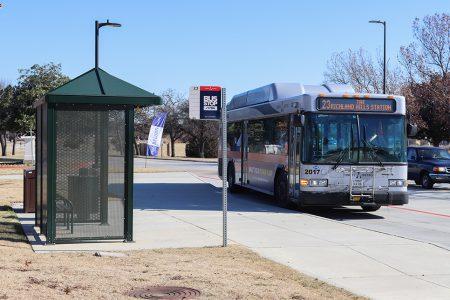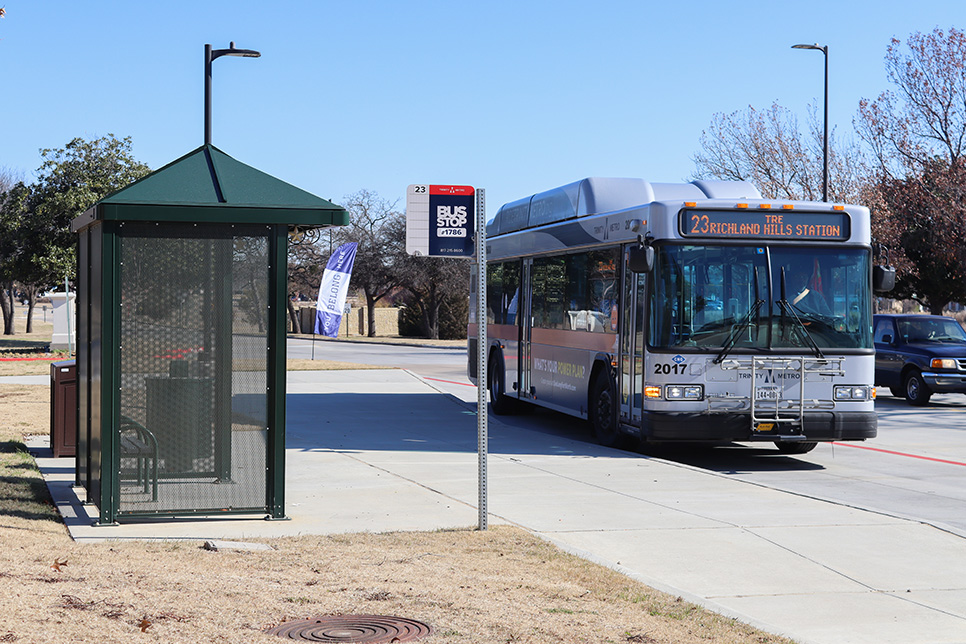
Photo by Alex Hobin/The Collegian
Alex Hoben
photo editor
alexandra.hoben@my.tccd.edu
Students with specialized degree plans want there to be more accessibility in the aspects of cross-campus life.
Across TCC’s five in-person locations, there are many pathways available. But, sometimes, a student chooses to pursue one that isn’t offered at their home campus. This forces them to look into options at areas that could be across the county, and they can’t always make the trip.
According to NW academic adviser Elizabeth Bradley, when considering taking classes at other campuses, students need to be aware of what the program entails. Especially when it comes to the commute and the requirement for transportation. She said it’s her job to inform students of their choices.
“Try to educate them on, ‘This is where they’re going to go, and this is what you need,’” Bradley said. “It’s all about educating about where it is, what you can do online and what you can’t.”
When Bradley is presented with a student who needs to use public transportation options, she offers the bus routes connected to the district because of the convenience of cost. Through an ID, students have free access to the Trinity Metro, but Bradley cautions the students about using it.
“The bus services aren’t a user-friendly system,” she said.
NW student Elizabeth Chi was more vocal about her disappointment in the public transport system offered. She explained that when she researched a route she could use, there were no buses connected to NW Campus by where she lives. She also said there’s a disconnect between campuses because of this lack of transportation.
“There’s a lot of classes that I would have liked to have taken,” Chi said.” “But they were at South Campus or at TR and I don’t want to drive over there. I know the bus mainly goes to more of the south campuses than the campuses up here, and there’s no connect between the north and the south, so it’s kind of dumb.”
While students are expressing support for TCC sponsored public transportation options, Bradley isn’t too sure it’s worth it. She said only one of 10 students she sees considers programs at different campuses.
“I don’t know if they would use it, I really don’t,” Bradley said. “I think that’s something that they would have to research on surveys.”
NW student Zachary McTaggart, who in one day travels from TR, NW and NE, said that while the bus routes are available, they aren’t preferable to driving because of the time it requires.
“Free means you have to wait,” McTaggart said.
Even for those students driving, there is still worry about commuting time and how it can affect their course structure. A typical drive between SE and NW — campuses in opposite directions — is 35 minutes. But according to Chi, traveling between campuses during rush hour can take much longer.
“There’s horrible traffic when I have to go,” she said. “It takes like 45 minutes to an hour from NW to NE.”
Currently, each campus has at least two specialized programs that are only available at that location. These programs focus on work experience and hands-on learning, according to Bradley. As well as a plethora of unique courses. Through the school’s website, students can research the classes available, but McTaggart doesn’t feel that they’re upfront with the campus’ availability.
“If you see TCC offers sailing classes, it’s kind of misleading if you can’t travel here,” McTaggart said, referring to NW KINE-1117. “I don’t think they offer as much information as they could.”
This campus separation and specialization is even reaching the early college high schools. Arlington Collegiate student Aurora Barragan is currently on track to earn her high school diploma as well as her associate of arts, but that’s not her passion.
“I want to be a film major,” she said. “I’ve looked for the NE TCC Campus. That’s where I’ve been able to find more classes related to that.”
Barragan is graduating in May then will look at options at TCC. But in her initial search for the classes she would want to take, she realized it would be at a campus she’s never been to.
“Even for me here at SE, it was hard for me to adjust,” Barragan said.
Though she has doubts about the change, she said it would be best for her to be in person than on the Connect Campus.
“I feel like it’d be better hands-on than online,” she said. “Especially for when they’re talking about equipment.”
McTaggart also said how there wasn’t a lot of connection between campuses with specialized events. Primarily because the way information is distributed varies by campus.
“If you’re only going to one campus, you don’t know what’s happening at the other ones,” he said.

